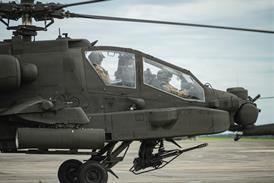Herman De Wulf/BRUSSELS
STRIKING SABENA workers closed down the airline on 29 November in the first of what is expected to be a series of industrial actions following the abrupt cancellation of all labour agreements on 27 November.
The unprecedented contract move surprised observers who are used to Belgium's long-standing tradition of consensus, and the fact that the national airline is largely Government-owned.
Sabena president Pierre Godfroid announced the cancellation himself, saying that "...confrontation has become inevitable as the unions do not want to co-operate". He wants them to agree to "...work more for less pay", by freezing salaries at their present levels for three years from 1 January, 1996, re-introducing the 40h working week - the Belgian national carrier's staff work 38h, compared with shareholder Swissair's 42h working week - and adding job flexibility within the airline.
The unions are willing to talk about job flexibility, but are adamant that a wage freeze and an increase in working hours will not be discussed.
They are refusing to give advance notice of strikes, however, hoping to retain a surprise element to create maximum impact. In the past, advance warnings have enabled management to counter strike action by mobilising extra staff.
Air-transport analysts say that Godfroid's aim is to rid the airline of Belgium's previously sacrosanct salary-indexation system. The scheme, which was introduced some 30 years ago, guarantees Belgian workers automatic cost-of-living increases. Godfroid justifies his move by saying that five salary increases since 1991 have cost the company BFr1.3 billion ($45.8 million), while at the same time competition has caused fares to drop 40%.
"By freezing our salary costs for a three-year period we will be able to save BFr750 million," he says.
He is willing , however, to break new ground, saying: "If the unions agree to my plan, I am willing to create another 1,000 jobs. In addition, I am willing to share the profit the company makes with staff. I have earmarked 25% of the company profit for this". The unions are unimpressed, saying that the 1,000 jobs will be low-paid temporary positions.
Source: Flight International























